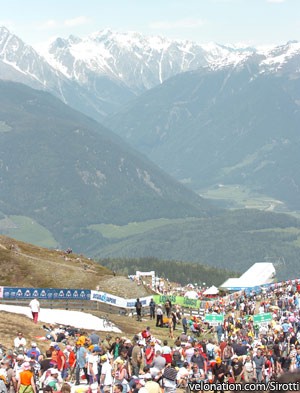Zomegnan dismisses claim that doping is encourage by multiple mountain stages
 RCS Sport presented a spectacular Giro d’Italia route Saturday in Turin. From May 7 to 29, it covers 3496 kilometres, climbs 24,000 metres and finishes on a mountaintop seven times.
RCS Sport presented a spectacular Giro d’Italia route Saturday in Turin. From May 7 to 29, it covers 3496 kilometres, climbs 24,000 metres and finishes on a mountaintop seven times.
However, is the Giro d’Italia encouraging doping with such a hard route?
“Doping is a cultural problem,” said race director, Angelo Zomegnan in an interview with Gazzetta TV.
“Ben Johnson tested positive at Seoul. What are we to do, change the 100 metres to 80 metres? Take away 20 per cent of the difficulty? No one is asking the climbers to go up the mountains at an average of 30. They can climb it at 10 kilometres an hour. What’s important is that there is a mountain because the mountain puts everyone in their place, climbers, time trial riders, sprinters…”
Next year’s Giro d’Italia route features 40 classified climbs that will give points to the mountains competition, the Passo Giau is the highest at 2236 metres. Zomegnan said that it is inline with the previous editions.
“What is different is that the mountains are pushed to the final. There are 25 kilometres of climbing in the last 50 kilometres of the Gardeccia stage [15]. The Mercogliano stage [7 at 100km] is very short, but you finish with 17 kilometres of climbing at a five per cent average grade. It is not a high average and there are only a few points of 10 per cent.
“The double day up Etna – up from Linguaglossa and up to Rifugio Sapienza – won’t be easy. There will not be space for tactics. Of course, there are times when you see a group of sprinters at the top of the climb, on the front row.
“We will decide on May 29 in Milan. We will see how the riders interpret it. For example, Liège-Bastogne-Liège is the hardest of the one-day spring classics when you consider the amount of climbing. Instead, this year, there were 80 riders in the group with two climbs to go. It is not the course, but the riders who make it. However, if you do not put in the amazing climbs then you are at risk of losing people’s attention. The more difficulties there are, the more chances the riders have to express themselves and the greater the probability of a good show.”
In recent years, many riders have tested positive at the Giro d’Italia or been involved in doping case shortly after, including Ivan Basso, Riccardo Riccò, Emanuele Sella, Danilo Di Luca.
Next year’s Tour de France route, in comparison, covers 3,471 kilometres and has four mountaintop finishes in three weeks. Its highest point is the Col Agnel at 2744 metres.